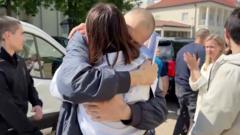In the wake of a rebel takeover in Aleppo, locals experience mixed emotions of joy and apprehension. While family reunions take place, concerns about safety and the potential return of violence loom large, raising questions about the true stability of the region.
Family Reunions Amid Uncertainty: Life in Rebel-Controlled Aleppo

Family Reunions Amid Uncertainty: Life in Rebel-Controlled Aleppo
As a major offensive shifts control of Aleppo, families reunite but face fears of renewed conflict and instability under rebel rule.
As Aleppo falls under the control of the armed rebel group Hayat Tahrir al-Sham (HTS), the city's residents rejoice in personal triumphs while grappling with an overwhelming sense of unease. Abdulkafi, an English teacher, recently reunited with his 85-year-old father after years apart due to the civil war's division of the city. "He never dreamed he would see me again before he died," Abdulkafi recounted, his heartfelt reunion captured in a poignant video.
Concerns are widespread among interviewees from Aleppo, who reported feeling welcome by HTS fighters but are also wary of the implications of their new rulers. With tens of thousands displaced due to ongoing conflict, the lingering fear of airstrikes from the Syrian government and Russian forces casts a shadow over daily life. Residents expressed their apprehensions—one man shared, “We’re living in complete apprehension,” echoing the sentiments of many worried that violence could erupt again at any moment.
Aleppo, once a center of resilience, experienced relative calm after being retaken by government forces in 2016. However, the recent unrest has shattered that lull as locals now harbor distrust toward HTS, known for its previous ties to al-Qaeda. Although the group claims to have moderated its ideology, stories of human rights abuses linger in the community's memories. Abdulkafi lamented that some family members fear being seen with him in case regime forces reclaim the territory.
Despite these fears, some individuals expressed their relief at HTS's governance compared to the government’s. As one local noted, "We are grateful that these armed groups have taken over. They are better than the government." Yet, faith in HTS remains cautiously maintained; many voice their anxiety over potential food shortages and the incessant threat of bombardment.
The Christian community in Aleppo has reported a peaceful coexistence with HTS forces thus far, but many remain skeptical about the group's promises of safety. The history of jihadist militias targeting minority groups adds weight to their caution. George Meneshian, a political analyst, observed, “There are precedents for Islamist militias initially not harming anyone, but afterwards committing crimes against minorities.”
As the situation in Aleppo unfolds, the balance between relief from past oppression and the uncertainty of future conflict remains delicate. Many locals like Abdulkafi strive for stability, fervently hoping that their new reality will be kinder than the memories of war that haunt them.






















